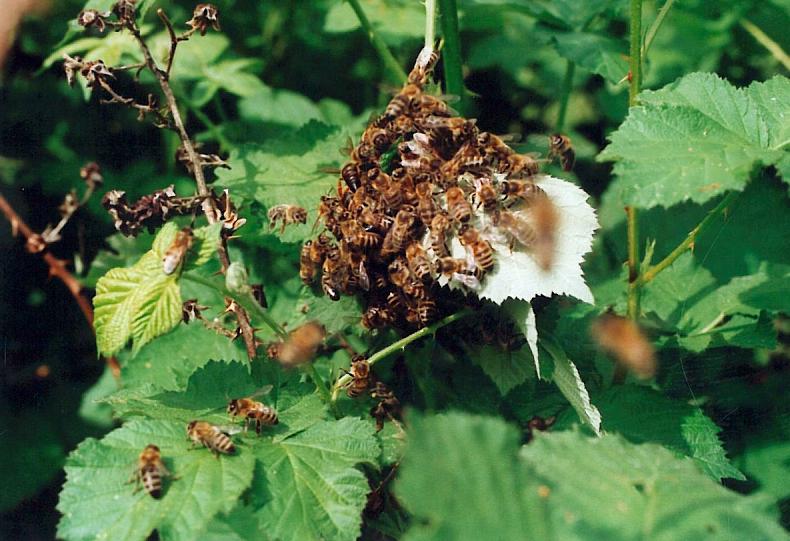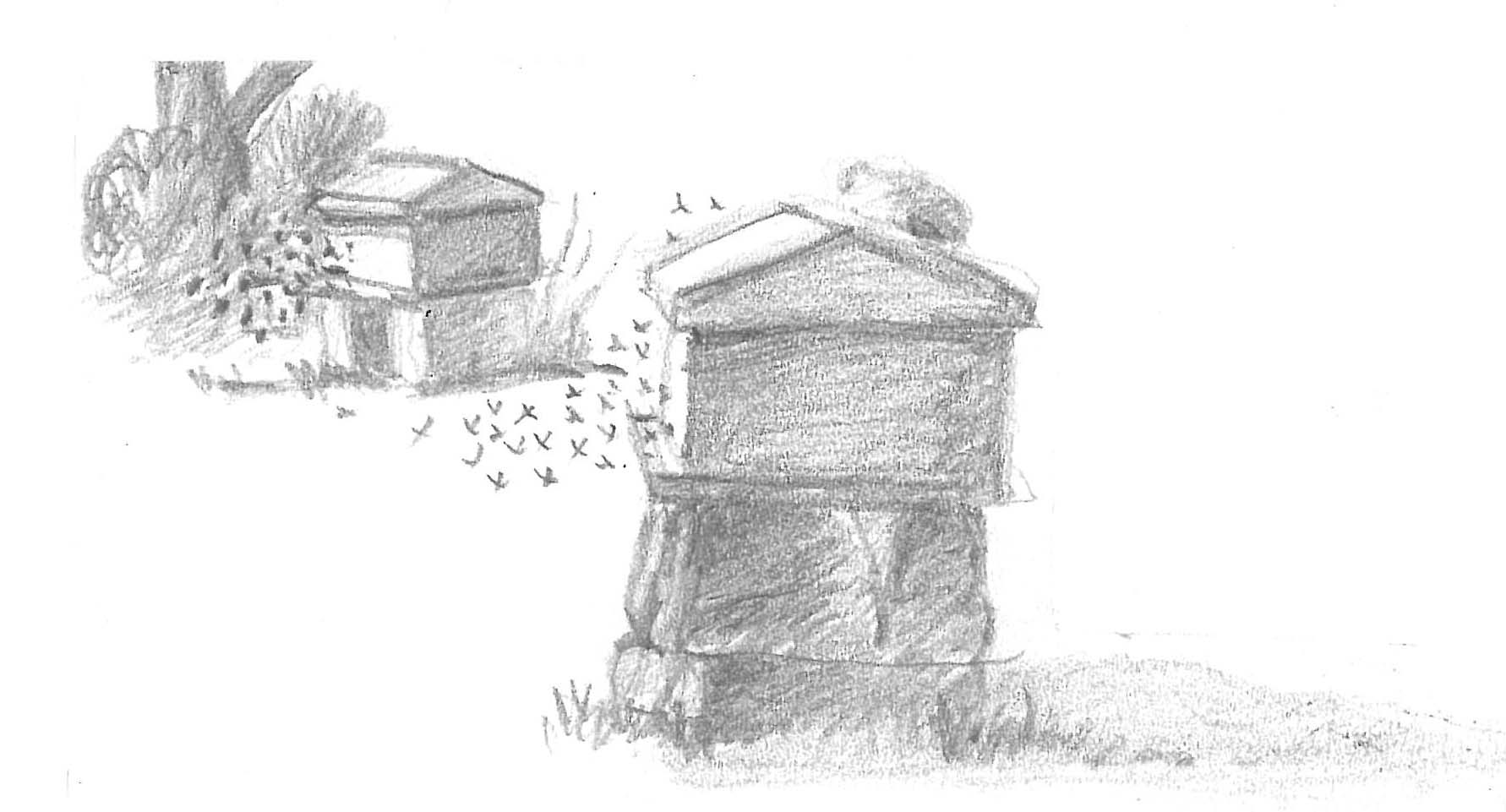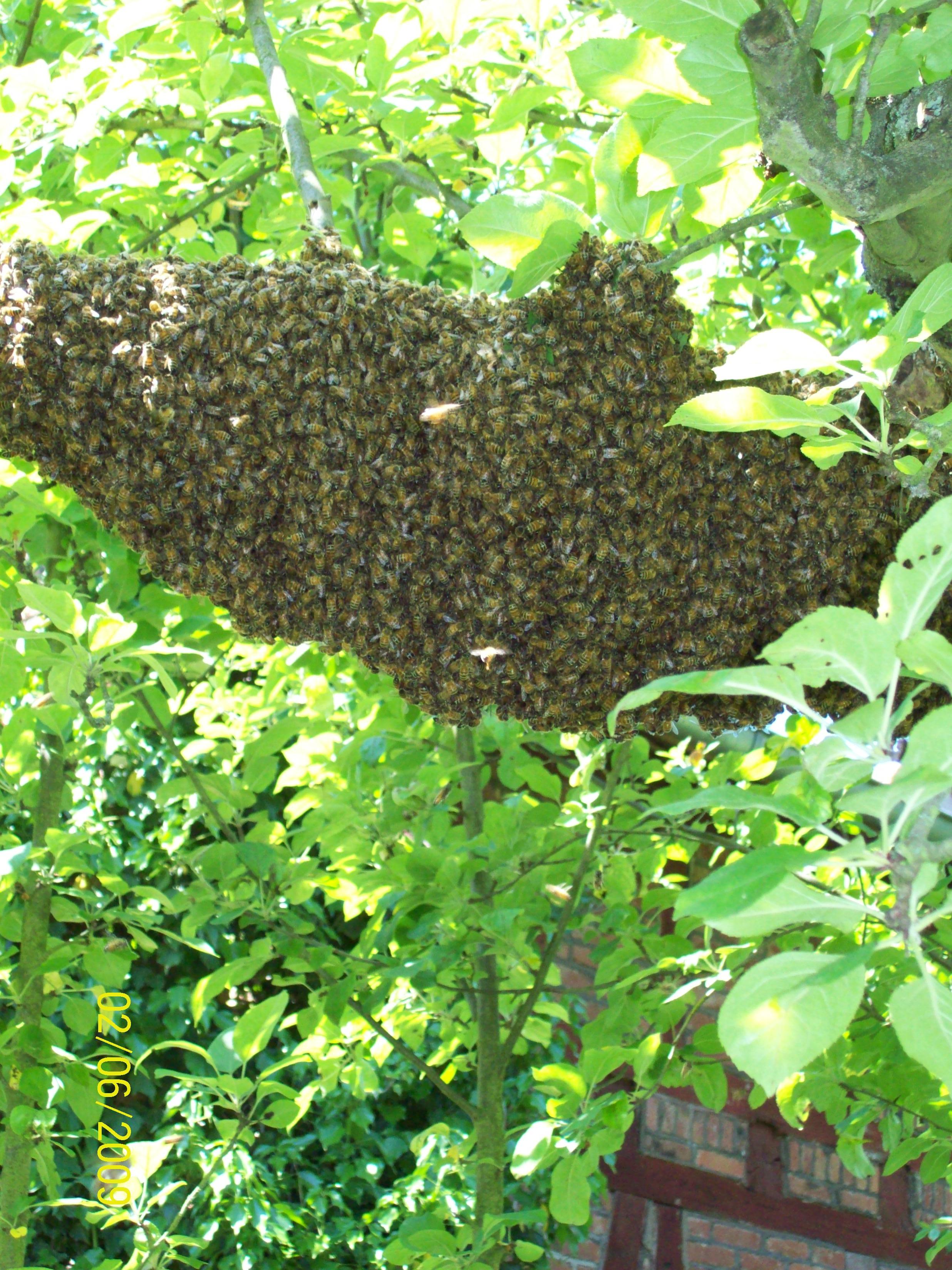



Sign
up for bee-therapy | Beauty-cure
| Anti-aging | Infertility
| Cancer
of the breast | Hashimoto-Thyreoiditis
|
Crohn's disease
Rheumatism
| Juvenile idiopathic
arthritis | Heart
diseases | Arteriosklerosis
| MS |
Diabetes
| Neurodermitis
| Obesity |
Depression
and Psychosis
Allergies
| Alzheimer
/ Parkinson | Diseases
of the kidneys | Pancreas
| how
to improve fitness of the body
Propolis
| Beeswax | Royal
Jelly | Organic Honey |
Comb
in the Comb | Raw Honey
| Organic Beekeeping
Basic Course
Expertise
| Courses | Home
| Research | Save
Beecolonies-Bienenpatenschaft | Certification
| Training Apitherapy
Farming, Manifold Landscape
And The Socalled "Third Industrial
Revolution" Part II
The biologist
and FAZ - science journalist Joachim Müller-Jung explains enthused
the pretended boom in that "third industrial revolution "; he speaks of
„Rekord hunting" and romanticizes: „The seventh year in succession the
growing of genetically engineered cash crops has increased, and admittedly
more powerful than ever: for at least nine millions hectare, or 15 percent
on now 67, 7 Millions hectare worldwide. (.. .) more than seven millions
farmers in eighteen countries" shall have referred to genetically engineered
kinds in the earlier last year „more than one million more as in the year
before. And that is supposed to be only the beginning" (1). In respect
to the new law on GMOs in Germany, which forcibly prescribes labelling
and thus offers the possibility to the consumer to decide himself between
genetically modified food products and those, containing no GMOs
- Mr. Müller-Jung says lapidary: the Minister for Consumers and Agriculture
Mrs. Renate Künast has generated therewith a „poisoned political climate
and promoted" (2) and „sat down a signal, that must hit those, who work
at the 'innovations' of the green genetic engineering, deeply" (3).
The Biotec - industry was after all accustomed from countries like the
United States, Argentina, Romania, Bulgaria, Brazil, Mexico, South Africa,
Australia, India, Uruguay and even Spain to pushing it’s products unrecognized
underneath the consumer’s food. Here and there a few backhander -- and
the drawing up of clearance certificates and the approbations for the cultivation
of the GM - kinds functioned - as it turned out recently in some cases.
The new numbers of the international agriculture agency (ISAAA), who
evaluates annually the cultivation data from all countries, have prompted
Mr. Müller-Jung to give a shout of triumph: „The green genetic engineering
is on the advance "( 4). -- but also the refusal of the green genetic modification
in the population! - even in the USA.
Scientists being tarred with the same brush as Mr. Müller-Jung
estimate the spread of the green genetic modification as a type of natural
necessity. They praise this aberration as especially prodigiously innovation
within humanly technology and describe themselves and congenial scientist
as open-minded and impartial - though it applies the exactly opposit.**
What is a critical consumer thinking about, if he is reading the followings
in the FAZ : Bulgarian farmers planted on some thousand hectare transgenic
cash crops, or in Romania „the area under cultivation with genetically
changed soy plants increased even for 50 percent on now 70.000 hectare
"( 5), or „besides the United States count Argentina, Canada, China, South
Africa and Brazil to the most important user-states of the green genetic
engineering. All six states together own 99 percent of the global
acreage with transgenic plants. With each more than 50.000 hectare follow
behind it Australia, India, Romania and Uruguay" (6).
The critical consumer who is not brushing aside his worries, thinks
the landscape in those countries get corrupted (how such landscapes look
like is described below) and agricultural products, bee products, as well
apitherapeutic compounds ( propolis, honey, pollens etc.) from these countries
can be no longer unseen purchased. Who tells me, that those products are
not contaminated with GMOs? People will runaround to other countries to
purchase the product or take care to an exactly identification and labelling.
Not unreasonably more farmers go organic, close themselves ( also
conventional farmers) together and found a „GM-free zone ", and more beekeepers
are interested in international certification systems like T+T
Certification system.*
According the FAZ even „the President of the German Farmer's Union,
Mr. Gerd Sonnleitner, who still before a few years was a supporter of each
innovation on the field, has himself therefore positioned sceptical "(
7).
Many scientists in institutions as USDA, USAID, (two of the most active
pro-GM organisations in the world as reported below), including billionaires,
who want to help the poor and suffering people by their high donations
amounts ( but cause the opposit, as the case Bill Gates shows) -
comply with dusty materialistic ideologies. A little practised judgement
and an unspiritual world view are not sufficient, to look through aberration
in science, technology and medicine, as little as a person who is sleeping,
can see while he sleeps, that he will be stolen very easily by a robber.
All this is the reason why farmers, who are experienced with GMOs and
side effects warn all the others not to listen to GMO promotion agancies
and their allies. American consumer associations give us a "who is who"
or "WHO DO YOU TRUST?" especially regarding trustworthiness of USDA: The
Bush Administration gave the USDA Secretary of Agriculture position to
Anne Veneman (who once served on Monsanto's Calgene Board of Directors).
She appointed Dale Moore as her Chief of Staff. Prior to playing his new
role of "protecting" consumers from food safety threats like Mad Cow Disease,
Dale Moore was the chief lobbyist for the National Cattlemen's Beef Association.
According to Reuters 2003 Canadian farmers with first hand experience
growing genetically modified (GMO) crops say the technology will damage
Britain's booming organic food sector and leave fields strewn with "super
weeds" grown from stray, leftover seeds. "I took the decision to stop growing
GM canola (the Canadian variant of rapeseed) because it was impossible
to stop it spreading to other fields -- the seeds cling to the machinery
and are easily transferred, even with intensive cleaning," David Bailey,
a Saskatchewan-based farmer told Reuters. "My neighbours all had the same
problem," he added. But suppliers of GM seeds say the majority of Canadian
growers are not complaining. "Conservative estimates indicate that 65 percent
of the Canadian canola crop in 2002 was genetically modified. It can only
capture this portion of the market if it offers significant advantages
to Canadian farmers," a spokesman for the London-based Agriculture Biotechnology
Commission (ABC), which represents major biotech firms like Monsanto, said.
Jim Robbins, a Canadian grower who is converting from conventional to organic
farming and who is also talking with UK farmers this week, said GMO crops
would ruin the livelihoods of organic farmers. "You can't grow organic
canola in Canada anymore, simply because the GM variety exists," Robbins
said. "The potential problems with GM crops have been well documented in
the UK -- our experiences bear out these concerns." A group representing
1,000 organic farmers in the Saskatchewan province has already taken out
a class-action suit against two major manufacturers of GMO crops for making
it impossible for them to grow rapeseed on their land, since they can no
longer guarantee that it is GM-free. But David Bailey said Canada's farming
sector is now facing an even bigger GM threat, this time from wheat, which
U.S. biotech giant Monsanto is keen to introduce. "With GM canola, we lost
a C$300-400 million (a year) market share because Europe stopped importing
it. If Canada grows GM wheat, we stand to lose much, much more than that.
It will shut off even bigger and more important markets for us," Bailey
said. Monsanto has been conducting field trials in western Canada to develop
GM "Roundup Ready" wheat for around three years. The plants are genetically
altered to be unaffected when the herbicide "Roundup" is used on the fields
to control weeds. What say the studies? In two separate studies, UK researchers
have found that bees carrying GM rapeseed pollen had contaminated conventional
plants more than 26 kilometres (16 miles) away and that if farmers grew
GM rapeseed for one season, impurities could stay in the soil for up to
16 years if not "rigorously controlled." Britain's public are also highly
sceptical of GM crops. There are no GM crops in the ground in the UK at
present and no imminent plantings. (8)
Suzanne Goldenberg Carman/Manitoba reports in the Guardian (UK): Under
the vast bowl of a clear summer sky, cheery yellow splashes of canola light
up the prairies for miles. The sight of it makes Reg Stow's heart sink.
When Reg and his wife, Beverley, started farming as a young Canadian couple
in the early 1960s, canola, as the local version of oilseed rape is known,
was the crop they could count on. If the bottom dropped out of the price
on the other crops they were growing on their 2,300 acres in the fertile
farmlands of Manitoba, they always knew that canola would come through
for them. No more. The Stows resisted the introduction of genetically modified
canola seven years ago, unlike their neighbours. But it started growing
in their fields anyway, as the pollen was brought in by the wind from surrounding
farms. There is no distinguishing their fields from those of their neighbours.
Now Canada is awaiting the second wave of biotech with Monsanto, the creator
of GM canola, working to put a GM version of wheat on the market. The Stows
see it as a disaster in the making. "A company should not be able to come
in and wreck a livelihood," said Mr Stow. "If they do here with wheat what
they've already down with canola, then we are lost." British farmers have
been looking to Canada as the closest parallel to UK conditions with similar
crops and markets. As in Britain, GM has been marketed as providing higher
production for lower overheads but it is clear that after seven years'
experience cross-contamination with other crops has occurred on a large
scale. In Canada, reservations about the second generation of GM have spread
like brushfire. The new strain manipulates the DNA of the most widely grown
variety of bread wheat to make it resistant to Roundup, Monsanto's leading
weedkiller, which accounts for 40% of the company's sales. Monsanto argues
that GM wheat will cut costs and increase yields by simplifying weed control.
It could enter production by 2005, pending government approval. But the
major producer associations - the Canadian Federation of Agriculture, the
smaller, leftwing National Union of Farmers, and the Canadian Wheat Board,
which exercises a near-monopoly on sales - are adamantly opposed to the
GM wheat, branded Roundup Ready, and have called on the government to block
it. The uproar over Roundup Ready is rare for Canada, where consumers have
unknowingly eaten food with GM ingredients for years, because there is
no labelling requirement. As much as 80% of canola grown in Canada is genetically
modified. But far more is at stake now. Wheat is the lifeblood of western
Canada, which produces up to 25m tonnes a year - or nearly 20% of the world's
supply of bread, pasta and cake flour. The crop brings in 4bn Canadian
dollars (£1.8bn) each year, and 85% of those earnings is from exports.
If Canada embraces GM wheat, those earnings would collapse because its
customers in Europe and Asia have said they will not buy it. "About 82%
of our customers say they do not want to receive any GM wheat in our products,"
said Gord Flaten, a marketing director for the Canadian Wheat Board, which
exercises al most sole control over the marketing of Canada's wheat production.
"It should not be introduced." Europe's ban on GM products would force
Canada to segregate conventional wheat ruthlessly from the Roundup variety.
However, many in the industry are sceptical that Canada's aging storage
and transport system can offer such guarantees, and fear it would lose
its reputation for high quality wheat. "You can find Roundup Ready canola
almost anywhere you look," said Rene Van Acker, a plant scientist at the
University of Manitoba, and author of a study critical of the GM wheat
variety. "Nobody gives it a second look any more." Agronomists expect a
similar outcome with GM wheat. (9)
John Vidal, the Guardian's environment editor gives a note on prominent
supporters of Biotech: Bill Gates wants to do public good with the immense
profits of his IT empire, and over the past few years his foundation has
given more than $6.5bn to global causes. The money has been well-received
as socially useful and, generally, sensibly directed. But this week the
Gates Foundation, the largest philanthropic organisation in the world,
was strongly criticised when it gave $25m to GM research to develop vitamin
and protein-enriched seeds for the world's poor. In scientific terms, this
is not a lot of money, but it is expected to be just a first tranche and
to stimulate what the GM companies say is the second generation of GM crops
- those that are potentially of some real use to ordinary people. Gates
was bitten hard by international charities, farmers' groups and academics
in Europe, India and elsewhere, who argued that the money would not go
to addressing poverty, the root cause of worldwide hunger, but would promote
an agriculture that was of little use to the very poor. He was further
accused of being captured by an industry now using the hungry as a "Trojan
horse" to get its biotech into poor countries. The foundation, and the
research organisations who will spend his money, deny all charges, saying
that the poor are in desperate need of vitamins and micro nutrients, and
arguing that GM will give the poorest a choice. But there are reasons to
believe that the Gates food agenda is now being shaped by US corporate
and govern ment interests. The Gates Foundation has recently appointed
a Kenyan ex-Monsanto scientist to one of its boards, and last year joined
Kraft foods, a subsidiary of Philip Morris, the world's largest and most
profitable tobacco corporation, in a programme to add vitamins to conventionally
grown foods. Gates, moreover, has chosen for his latest venture to partner
the US Department of Agriculture and USAID, Washington's overseas aid organisation
- two of the most active pro-GM organisations in the world. Also helping
with money or research, are several US government groups and universities
who have benefited from government biotechnology grants. The other major
financial partner is the World Bank, which is reviewing the costs and benefits
of GM to poor countries. The Gates money, however, is directed at some
of the least known but most controversial organisations on the global stage.
The research will be done mainly by the International Centre for Tropical
Agriculture and the International Food Policy Research Institute. Both
are part of the little-known Consultative Group on International Agricultural
Research (Cgiar). This family of 16 global public institutes forms
the world's largest public plant-breeding effort for poor farmers and has
immense say on the direction of world agriculture. But Cgiar is widely
accused of being a creature of its two major funders - the US and the World
Bank. The bank, dominated by the US, not only houses its secretariat, but
provides its current chair. Cgiar is only slightly better than the WTO
when it comes to accessibility. It has only once held an annual meeting
outside the bank offices and, when it did - last year in Thailand - there
were major demonstrations against it by international and local farmers'
organisations complaining that it was promoting a top-down, one-size-fits-all
approach to research that ignored the knowledge and experience of farmers
and indigenous people. Cgiar's public research, say NGOs in Asia, Africa,
Latin America and Europe, is being quietly corporatised, centralised in
Washington and becoming remote from farmers in the developing world. They
argue that having promoted the "green revolution" of the 1960s - which
introduced high-yielding, chemically dependent crops - Cgiar is now using
large amounts of public money to develop GM foods, once again without consulting
the people who the technology will most affect (10).
With hundreds of millions of small farmers around the world already
in crisis because they cannot compete with US or EU subsidies which mainly
go to corporate farmers, the Gates donation is seen to be supporting something
irrelevant to most farmers - another kick in the teeth for those in poverty
and an endorsement of a widely questioned technology dominated by vested
big science interests. Cgiar says its work is for the public, by public
servants and it is aware of the power of GM companies to muscle in. But
its backing of GM goes well beyond honest research. Last year it controversially
invited the Syngenta Foundation on to its board. This charitable,
nominally independent organisation is owned by the largest GM company in
the world and run by a former British civil servant who worked at the Department
for International Development. Insiders believe it is only a matter of
time before the Gates foundation is offered a place, too. But why should
the Gates Foundation be interested in a small, obscure organisation like
Cgiar? Apart from strongly influencing the direction of world agriculture,
one answer is that it is the custodian of more than 600,000 seeds, something
that has been called the "collective wealth of nature and the food security
of the world". Almost every crop that has ever been grown is held in trust,
and the unpatented genetic bank is of immense potential wealth to life
science companies, not just for food but medicine. Already many have
been investigating partnerships. Bill Gates's foundation appears
the innocent newcomer to the mucky world of global malnutrition and food
security. The trouble may be that his foundation's increasing influence
on the world stage makes it a prime target for those who have an agenda
well beyond the public good, sayd John Vidal, the Guardian's environment
editor (11).
___________
*)
More information and address source for Bee-produce from beekeeping
considering the character of bees - for instance: comb honey with
natural cristalization (not heated) and honey from natural combs
(neither extracted nor stirred nor heated before filling) as well as pure
beewax without residuals under :
List
of beeproduce
Centre
for social Medicine and Natural Apitherapy
Centre
for Ecological Apiculture.
Beekeeping
courses (practical and distance) in the Centre for Ecological Apiculture:
start now with ecological top-bar-beekeeping for beginners!!
**)
see also "Apicultural
Review Letters I"
Notes and literature
see full version
Full version in: Natural
Science Vol. 3 Issue 1/2004
Copyright
© Centre
for Food Quality

